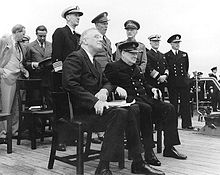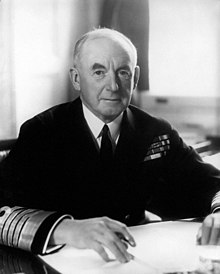Dudley Pound
Sir Alfred Dudley Pickman Rogers Pound GCB OM GCVO (born August 29, 1877 on the Isle of Wight , England , † October 21, 1943 ) was a British naval admiral , who was most recently First Sea Lord in the Royal Navy .
Life
First World War and post-war period
After attending school, Pound, son of a barrister , joined the Royal Navy in 1891 and was promoted to sea captain in 1914 . As such, he was commandant of the battleship HMS Colossus during the Battle of the Skagerrak in 1916 . Subsequently, he was director of the Department of Operations of the Admiralty until the end of World War I and was promoted to Rear Admiral.
He then moved to the naval planning department and became director of this department in 1922. In 1925 he moved as chief of staff to the Mediterranean Fleet , whose supreme command was Admiral Roger Keyes , before he became commander of the battlecruiser squadron in 1929.
In 1932 he became second sea lord and chief of the naval personnel. In June 1933, he was knighted as a Knight Commander of the Bath knighted and led from then the name suffix "Sir". As the successor to Admiral William Wordsworth Fisher , he became Commander-in-Chief of the Mediterranean Fleet on March 20, 1936 and held this function until his replacement by Admiral Andrew Cunningham on June 1, 1939. In May 1937 he was named Knight Grand Cross of the Royal Victorian Order and im Awarded Knight Grand Cross of the Order of Bath on January 1st, 1939 .
Second World War and First Sea Lord

This was followed by his promotion to Admiral of the Fleet and his appointment to the First Sea Lord. In this role he was also Chief of Naval Staff until his death . Deputy Chief of the Admiralty Staff was Rear Admiral Tom Spencer Vaughan Phillips , who was also Lord Commissioner of the Admirality .
In 1940 there were repeated clashes between him and Prime Minister Winston Churchill with Admiral John Tovey , the commander in chief of the Home Fleet in Scapa Flow . After several British ships were inexplicably sunk by the German navy in the first few weeks of World War II , Pound wrote in a report to Prime Minister Churchill that the Germans had a secret weapon that would cause frightening losses.
Shortly before the French surrender at the Armistice of Compiègne in June 1940 , Pound traveled to Bordeaux on behalf of Churchill, together with the Colonial Minister Lord Lloyd and the First Lord of the Admiralty AV Alexander, to discuss the modalities of the surrender with the Commander in Chief of the French Armed Forces, Admiral François Darlan to discuss and to be assured by him that not a single French warship would ever fall into German hands.
Between 1941 and 1943, Pound was also first aide-de-camp of King George VI. in naval matters.
In his role as First Sea Lord function, he ordered the Rösselsprung , an advance of heavy surface units of the German Navy from July 2nd to 5th, 1942 in the North Sea against the Allied North Sea Convoy PQ 17. , on July 4th, 1942 the accompanying cruisers to flee : "The cruiser formation to leave at maximum speed to the west." And an hour later the dissolution of the convoy: "Dissolve the convoy and continue individually to Russian ports." About half an hour later, a correcting order was issued: "Convoy is to be dispersed."
In January 1943 he was one of the participants in the Casablanca Conference and worked with the other military representatives to develop sophisticated strategic concepts that stated that a landing in Normandy would only give the Germans an easy victory. For the time being, the Mediterranean remained the only theater of war where the risk was kept within manageable limits.
After his death on October 21, 1943, his body was cremated and his ashes were handed over to the sea from HMS Glasgow on October 27 in the Straits of Dover , near the Nab Tower. He was then followed again by Admiral Cunningham, who had previously acted for him in September 1943, as First Sea Lord.
literature
- Una McGovern (Ed.): Chambers Biographical Dictionary . Chambers, Edinburgh 2002, ISBN 0-550-10051-2 , p. 1226.
Web links
- Newspaper article about Dudley Pound in the 20th century press kit of the ZBW - Leibniz Information Center for Economics .
Individual evidence
- ↑ a b Knights and Dames: OT-RAY at Leigh Rayment's Peerage
- ^ Raymond Cartier : The Second World War , Munich 1967, p. 46.
- ^ Raymond Cartier: The Second World War , Munich 1967, p. 222.
- ^ History of naval warfare (July 1942)
- ↑ a b J. Piekalkiewicz : Sea War 1939-1945 . Bechtermünz, Augsburg 1998.
- ↑ Brian Betham Schofield : Convoy Battles . Koehlers, Herford 1983.
- ^ Raymond Cartier: The Second World War , Munich 1967, p. 704.
| predecessor | Office | successor |
|---|---|---|
| William Wordsworth Fisher | Commander in Chief of the Mediterranean Fleet 1936–1939 |
Andrew Cunningham |
| Cyril Fuller |
Second Sea Lord 1932–1935 |
Martin Dunbar-Nasmith |
| Roger Backhouse |
First Sea Lord 1939–1943 |
Andrew Cunningham |
| personal data | |
|---|---|
| SURNAME | Pound, Dudley |
| ALTERNATIVE NAMES | Pound, Alfred Dudley Pickman Rogers (full name) |
| BRIEF DESCRIPTION | British naval admiral |
| DATE OF BIRTH | August 29, 1877 |
| PLACE OF BIRTH | Isle of Wight , England |
| DATE OF DEATH | October 21, 1943 |

